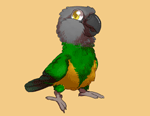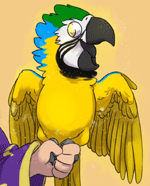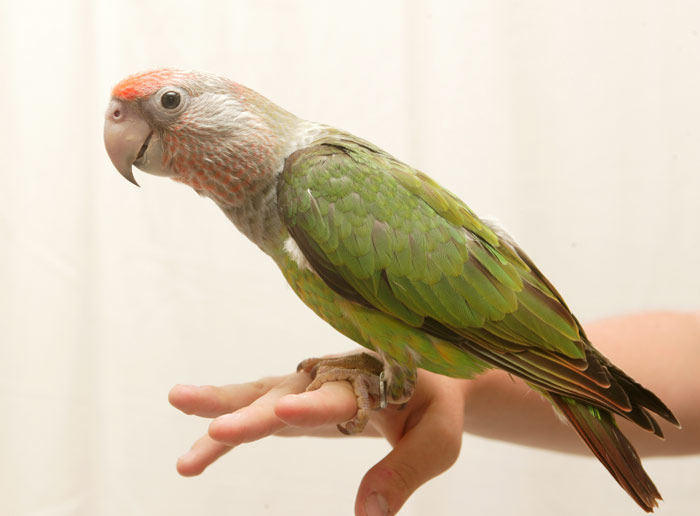 Kili
Type: Senegal Parrot
Genus: Poicephalus
Species: Senegalus
Subspecies: Mesotypus
Sex: Female
Weight: 120 grams
Height: 9 inches
Age: 17 years, 8 months
|
 Truman
Type: Cape Parrot
Genus: Poicephalus
Species:Robustus
Subspecies: Fuscicollis
Sex: Male
Weight: 330 grams
Height: 13 inches
Age: 15 years, 11 months
|
 Rachel
Type: Blue & Gold Macaw
Genus: Ara
Species:ararauna
Sex: Female
Weight: 850 grams
Height: 26 inches
Age: 13 years, 8 months
|
List of Common Parrots:
Parakeets:
Budgerigar (Budgie)
Alexandrine Parakeet
African Ringneck
Indian Ringneck
Monk Parakeet (Quaker Parrot)
Parrotlets:
Mexican Parrotlet
Green Rumped Parrotlet
Blue Winged Parrotlet
Spectacled Parrotlet
Dusky Billed Parrotlet
Pacific Parrotlet
Yellow Faced Parrotlet
Lovebirds:
Peach Faced Lovebird
Masked Lovebird
Fischer's Lovebird
Lilian's (Nyasa) Lovebird
Black Cheeked Lovebird
Madagascar Lovebird
Abyssinian Lovebird
Red Faced Lovebird
Swindern's Lovebird
Lories and Lorikeets:
Rainbow Lorikeet
Conures:
Sun Conure
Jenday Conure
Cherry Headed Conure
Blue Crowned Conure
Mitred Conure
Patagonian Conure
Green Cheeked Conure
Nanday Conure
Caiques:
Black Headed Caique
White Bellied Caique
Poicephalus Parrots:
Senegal Parrot
Meyer's Parrot
Red Bellied Parrot
Brown Headed Parrot
Jardine's Parrot
Cape Parrot
Ruppell's Parrot
Eclectus:
Eclectus Parrot
African Greys:
Congo African Grey (CAG)
Timneh African Grey (TAG)
Amazons:
Blue Fronted Amazon
Yellow Naped Amazon
Yellow Headed Amazon
Orange Winged Amazon
Yellow Crowned Amazon
Cockatoos:
Cockatiel
Galah (Rose Breasted) Cockatoo
Sulphur Crested Cockatoo
Umbrella Cockatoo
Moluccan Cockatoo
Bare Eyed Cockatoo
Goffin's Cockatoo
Macaws:
Red Shouldered (Hahn's) Macaw
Severe Macaw
Blue And Gold Macaw
Blue Throated Macaw
Military Macaw
Red Fronted Macaw
Scarlet Macaw
Green Winged Macaw
Hyacinth Macaw
Glossary of Common Parrot Terms
|
I often receive questions about age for training parrots. People still have trouble believing that you can just as well train older parrots as younger ones. When I'm asked what kind of parrot can't you train? My response is "a dead one." All kidding aside though, age plays a far smaller role on training than people believe. Technique has far more to do with it than age. The right technique on an older rescue parrot is far more likely to be successful than poor technique on a younger hand raised one.
But given good training technique, there is one age of parrot that to me stands out as potentially the hardest to work with: young babies! Young weanlings with a poor upbringing have got to be the hardest parrots to keep (at least for the time being). Well raised babies can be a pleasure to deal with and almost too easy to be true (that doesn't mean you should assume they won't need training down the line to maintain that easy nature). However, a poorly raised baby that bites, doesn't step up, and is all around difficult puts the owner in a bind. The bird is too young to motivate with food/attention, too frail to food manage, too inattentive, and too inexperienced to know what to do.

For hand tame baby parrots, my best suggestion is to treat them like a baby. Instead of focusing on formal training, work more on exposing the parrot to anything and everything. Show it objects, take it around the house, let it try foods, let it feel different materials, etc. This will help it develop and make it more aware of its surroundings as it becomes older. The formal training that most of my blog covers is ineffective for wearnling parrots and even unnecessary. They are programmed to watch, mimic, and learn from their surroundings more so than adult parrots. This is your one opportunity to teach good habits and behavior without having to work too much for it.
Now when it comes to the dilemma of the untame baby parrot, things are tough. The bird won't work for food in training because it doesn't have to. You don't want to withhold or manage food because the baby is still growing. Heck, it is barely accustomed to eating hard food and it is important to let it eat and grow. On the other hand, since the untame baby bites, doesn't step up, and doesn't trust people, you won't be able to handle it the way you would like.
When it comes to the untame baby, patience is going to be your best tool. Waiting until the baby is old enough to become more interested in food - and when you can begin to manage the good to an extent - is when you can put a greater emphasis on formal training. Until then, work on building trust hands off by spending time around the bird and not forcing it to be handled. Since you cannot use food, attention, or pretty much anything else at this point as positive reinforcement, any handling you do will most likely result in punishment and only make the bird distrust further. Take things easy for a few months and wait for the bird to become more interested in food before beginning a target training based approach for building trust and teaching step up.

During the waiting period, work toward the bird accepting treats from you. Learn what its favorite treats are and begin to withhold them. Don't forget that the baby bird likely does not yet know what its favorite treats are so exposing it to a variety of foods to try is very important. As you begin to see which foods it prefers, stop giving them in the bowl and instead see if it will come over to you to take it. If it does, you can move on to target training (but keep in mind that the attention span of a young baby may be very limited so don't expect the kind of results you can get with an adult). If not, try laying foods down in places and removing your hand and seeing if the bird will at least eat the treat near your hand or in your presence. Keep working on trust so that the bird is comfortable eating around you and from you. With the untame baby parrot, it mostly comes down to waiting things out and then applying a formal training approach once the bird is of suitable training age. What that exact age is will depend on species and maturation process. Wait until the bird is at least a few months older and taking food from your hand.
Do not expect to be able to solve nipping, biting, and other issues with the baby parrot. A lot of people complain about nippy and even aggressive behavior in baby parrots but there just isn't a way around it. Those young birds don't know any better, are curious, and want try everything with their beaks. Punishment cannot be applied as it will cause major detriment to your relationship that has not even yet been established. The only thing you can do is avoid putting the baby in a position to be able to bite/nip and wait until it is old enough to apply a well-behaved parrot approach for the long term. Just one thing I want to assure you of is that the baby nippinesss usually wears off on its own or can later be solved. Don't feel that by not punishing it now that it will persist. Once you can begin formal training, it can fairly easily be solved.
I had plenty of trouble with Kili & Truman as babies. I wanted to teach them things but they just wanted to play or do something else. It was just a matter of patience and working through it in small amounts that eventually lead to the awesome pets they are now. But I've gotta say the two toughest times to work through are a parrot's adolescence and babyhood. Working with an adult parrot is much more consistent and predictable. This is why I often recommend an adult rescue parrot over a baby for many people. I think (despite common prejudice) that you can have quicker success with an average rescue parrot (merely in need of a new home) than a baby parrot that is too young to train.
In conclusion, since it is nearly impossible to train an untame baby parrot during that age, the best approach is to find a source for a mature rescue parrot or an already tame baby. This gives you the advantage of being able to start your bonding and training processes immediately. Given the amount of training you can have in the first few months you keep a rescue parrot, you may well find yourself ahead of where you'd be with an untame baby that forced you to wait until you can begin training. Keep these things in mind when looking for a parrot and try to avoid getting a baby parrot that isn't already accustomed to handling.
Part of: Taming & Basic Training, General Parrot Care
Taming Training Baby Parrot |
|



 Previous Article
Previous Article Next Article
Next Article